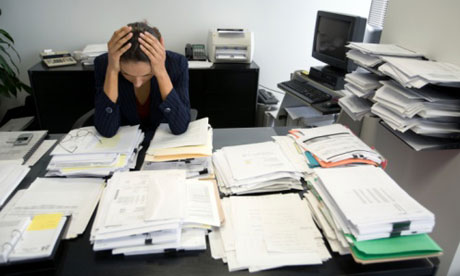
Several recent studies have come to the same conclusion: at work, and in general, women are feeling the pressures of stress more than their male peers.
Whether it's anxiety, a feeling of failure, or the need to binge-eat a sleeve of Oreo cookies, the experience of stress varies from person to person, but there are also themes that connect women's experience of stress.
For one, that stomach-churning anxiety is far more common in women than men.
A 2008 study led by Yale's Dr Tara Chaplin, whose research focuses on the role of gender and emotion, found that women are more likely than men to feel sad and anxious because of stress. Women are also more likely to ruminate on those negative feelings.
When we asked our female readers about their experience with stress last week, many of the 80 responders reported such feelings of anxiety or sadness:
Some days I sit in my bedroom and think of all the things I need to do, bills I need to pay, jobs I didn't get and question the foundation and fundamental parts of my present day life
Sara – New York, NY
I have more responsibilities than I feel I can accomplish in 40 hours each week. I put enormous pressure on myself to be perfect. I have work dreams when things get really bad.
Mallory – Portland, OR
The propensity to dwell on negative emotions, internalize stress and blame yourself may constrain many women's ability to work through stressful situations.
"If you think about it, sadness and anxiety are very passive emotions. If you're sitting there feeling sad and anxious, you're not as likely to problem-solve and be assertive. That could be a problem in the workplace," Chaplin told the Guardian.
Studies have also found that women rely more on their social circles than men when stressed. An oft-noted 2000 study found that women more often respond to stressful situations through a model dubbed "tend-and-befriend", while men follow the "fight-or-flight" model.
Dr Lynn F Buska, assistant executive director of research and policy for the American Psychological Association and a member of the APA's Stress in America survey team, explained: "Women tend to reach out for social support when stressed; they look to protect those around them. That makes sense, too, if you think about the early roles women held – they were the mothers, the caregivers."
Indeed, many of our readers expressed dealing with their stress by reaching out to others, be it family, friends, co-workers or a partner:
The best advice I've ever gotten is to find people you can talk to
Genna – Tampa, FL
I try to talk about it to people in a similar situation, like with coworkers. It's reassuring to know I'm not the only one with these fears.
Caitlin – Frederick, MD
To deal with stress I talk to one reliable friend who makes me laugh non stop - laughter is really the key to defusing stress!
Maireilis – New York, NY
Women's tendency to report higher levels of distress than men in surveys and studies may also be partly due to the way women and men are socialized to express themselves in the US and much of western Europe.
"Women may be more aware of their stress and able to admit it – and men may feel penalized for reporting stress or acknowledging it," Dr Bufka said.
Other ways women and men internalize gender roles from a young age may inform their relationship with stress, too.
Often, girls are taught to "think more about relationships, and subvert their needs toward the group's needs or towards others. Whereas boys are socialized earlier on to be more assertive and expressive about their needs," Bufka said. These attitudes can transfer to adult experiences, which may help explain why men report being better able to balance personal demands with work.
It is difficult to unpack the influence of such socialization from biological reasons why women may be more prone to feeling stressed than men. But one thing is true: women are consistently reporting higher levels of stress than their male peers – and as their presence in the workforce and role in society continues to expand, there is a good chance they will continue to feel the pressure.
Dr Chaplin suggested that women – and in fact, just about anyone feeling stressed – use more active methods of coping, rather than succumb to negative emotions.
"Rather than just sit there and feel stressed and sad, try and think 'OK, well what can I change about this situation to make myself less stressed?' Or 'What coping techniques can I use to make myself feel better?' Take an active role and thinking of healthy ways to cope – which could be anything from exercise, meditating, using some new mindfulness techniques, taking breaks for yourself," she said.
You can also check out our readers' tips on how they deal with stress here.
Yet, while it is important for women to learn how to cope with stress at work and at home, Chaplin noted that it is also important not to blame women for feeling stressed.
"I focus my research on how women and men cope with stress, but we also need to have a conversation about what can be done societally to reduce stress on women," she said. "Are there programs that can be in place for subsidizing daycare so you have good daycare,? Could we have longer maternity leave? These sorts of things are really important."

